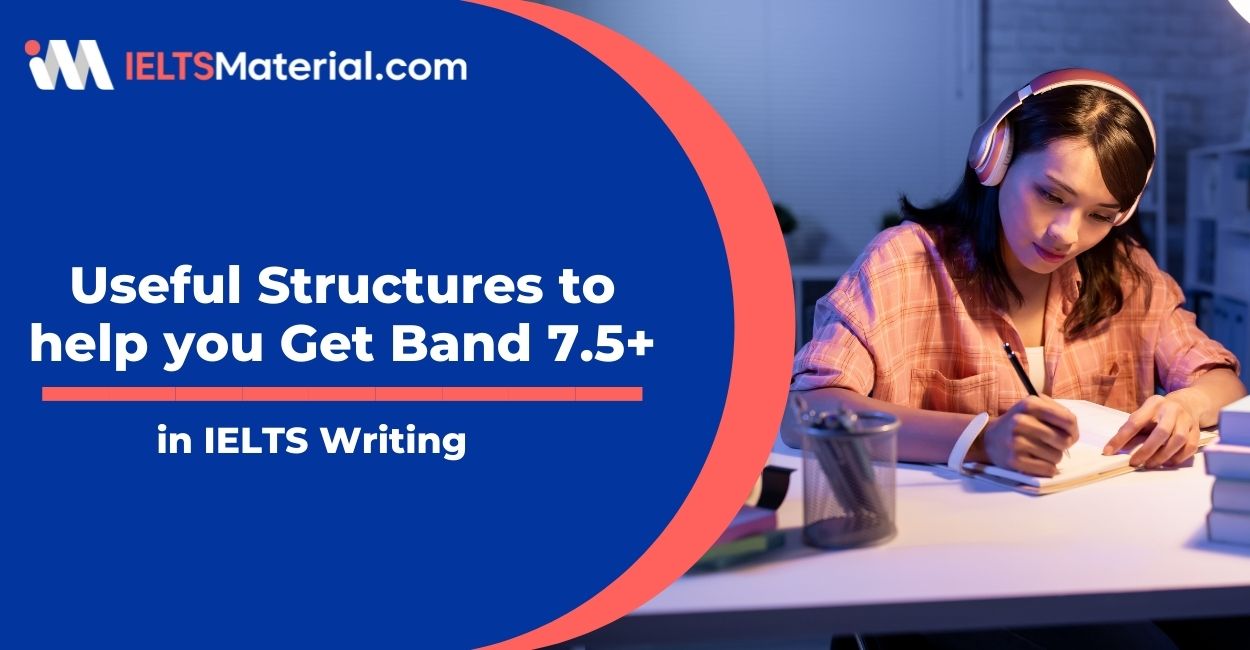Useful Structures to help you Get Band 7.5+ in IELTS Writing
3 min read
Updated On
-
Copy link
Curious about the 'Useful Structures to Help You Get Band 7.5+ in IELTS Writing?' Explore these expert-crafted sentence patterns designed to sharpen your writing and help you perform like a pro in the final exam!
Table of Contents

Try AI Essay Checker for Instant Band Score
One of the biggest mistakes most IELTS candidates make in IELTS Writing is to use complicated sentences in their Writing Tasks, which results in grammar mistakes and sabotages their band score.
Therefore, knowing how to make good use of complex structures for your IELTS writing Task 2 essay is an essential skill to get the band score you deserve. Nevertheless, bear in mind that we should use complex sentences in our writing rather than try to make all of our sentences complex. Complex sentences can be relative clauses, subordinate clauses, conditional clauses, or compound sentences.
As you all know, IELTS grammar and vocabulary play an indispensable role in IELTS. Some sentences are simple to understand while some are complex, and it is important to know the differences between the two to make proper use of them. You can go through the few useful structures below that help you to get a good band score. Before you begin, also check out our expert IELTS Exam preparation tips for band score of 8+
Structure to Get Band 7.5+ in IELTS Writing
Before we move on to sentence structures that talk about subjects, verbs, and objects. You should be aware of what these terms are especially while preparing for your IELTS Exam.
- Subject – The subject is the doer of the action or whoever the sentence revolves around.
- Verb – The verb usually follows the subject and identifies an action or a state of being.
- Object – The object of a sentence is the person or thing that receives the action of the verb. It is the who or what that the subject does something to.
Struggling with IELTS Writing? Book a FREE demo for expert guidance!
Note: This post will fully equip you with 10 useful grammar structures to help you boost your IELTS score!
1. When Subject+Verb+Object, Subject 1 +Verb 1 + Object 1
When a language/dies/out,/a whole way of life/disappears/with it.
2. While Subject+Verb+Object, Subject 1 +Verb 1 + Object 1
While some students/drop out/after a few years of studying,/others/finish/academic courses with poor degrees.
3. Subject+Verb+Object, resulting in an increase/a decrease in + the number of smth/the demand for smth
Many people in the countryside/migrate/into big cities,/resulting in an increase in/the demands for accommodation, food, and services in urban areas.
4. Subject+Verb+Object, giving rise to something
Advertisements/give/people more choices on what they want to buy,/giving rise to the consumer society
5. By doing something, Subject+Verb+Object
By spending money to protect minority languages,/governments/can/also preserve traditions, customs and behaviors.
6. Subject+Verb+Object and this will +Verb+Object
The use of private cars/is increasing/in Hanoi, and this will/put a strain/on its infrastructure.
7. Instead of + Verb-ing + Object, Subject+Verb+Object.
Instead of/driving/cars,/people/should use/public transport.
8. Subject+Verb+Object. This allows/urges/encourage something/somebody to do something (This will discourage somebody from doing something).
The utilization of cheap labour/help/companies to reduce production costs. This encourages business expansion.
9. Compared to those who (Subject)+Verb+Object, Subject+Verb+Object
Compared to those who/ hold / high school qualifications,/university graduates/often have/more employment opportunities.
10. If Subject+Verb+Object, Subject+Verb+Object
If air travel/ is/restricted,/people/would opt/for other means of transport such as buses and cars.
Book a FREE Online Webinar with Our IELTS Experts to Learn More Tips and Techniques for IELTS Writing!
When you are practicing IELTS writing questions, try to think of what you want to say in simple sentences, and then think of how these can be converted into complex sentences. After enough practice, it will be easier, and your writing will also improve.
If you are not sure what type of structure will help you get a band 7 or above score in IELTS, grab a seat in our best IELTS online classes to find out more!
Also Check:
Frequently Asked Questions
What is the most common misunderstanding of a test taker when writing complex phrases in IELTS Writing?
Why is it important to write complex sentences in IELTS Writing?
Give some examples of complex sentences
Define S+V+O.
Mention some tips on complex sentences for IELTS writing?
Explore IELTS Writing

Start Preparing for IELTS: Get Your 10-Day Study Plan Today!
Recent Articles
Haniya Yashfeen

Kasturika Samanta






Post your Comments
1 Comment